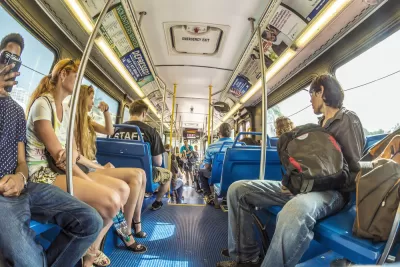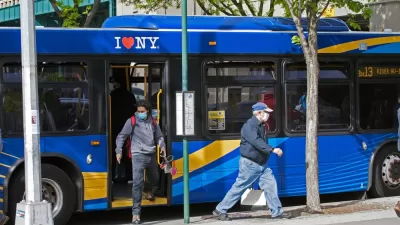An investigation of passenger complaints provides the starting point for an in-depth investigation of the service provided by Florida's largest transit system.

Douglas Hanks shares the findings on an investigation by the Miami Herald into customer complaints about the Miami-Dade Metrobus system. Requesting all complaints from bus passengers since the start of 2014, Hanks reports that through July of 2015, "there were nearly 27,000 [complaints] registered via email, online and call center. That’s roughly 47 per day, offering the most detailed look available at what irks, enrages and horrifies the system’s 210,000 daily passengers."
Among the complaints are horror stories involving cockroaches, a driver eating out of a cup with a spoon while operating the bus, and a bus route that routinely arrives 45 minutes late to deliver one man to work.
The Miami-Herald has also created an interactive database of "Bus Gripes," where interested transit observers can sort through specific complaints and compare the rating achieved by each of the system's routes.
Mayor Carlos Gimenez, who is up for re-election next year, "has pledged to usher in an era of cleaner and more efficient buses," according to Hanks. But critics of the mayor credit years of chronic underfunding for the current state of the system. Hanks also provides these details about Gimenez's goals for transit funding: "Gimenez restored Transit’s increase this year but has also pledged to end the agency’s current $100 million operating subsidy from transportation taxes by 2020. Backed by a county oversight board and other leaders who endorse the shift, Gimenez wants the operation subsidies spent on Transit projects included in the 2002 [sic] plan. The county’s budget forecasts hinge on an expanding economy should providing enough dollars in transit to make up for the lost sales tax money."
The article includes a lot more, in-depth reporting on the state of the system and the politics of transportation in Miami.
FULL STORY: On the bus in Miami-Dade, and not happy about it

Planetizen Federal Action Tracker
A weekly monitor of how Trump’s orders and actions are impacting planners and planning in America.

Maui's Vacation Rental Debate Turns Ugly
Verbal attacks, misinformation campaigns and fistfights plague a high-stakes debate to convert thousands of vacation rentals into long-term housing.

San Francisco Suspends Traffic Calming Amidst Record Deaths
Citing “a challenging fiscal landscape,” the city will cease the program on the heels of 42 traffic deaths, including 24 pedestrians.

Amtrak Rolls Out New Orleans to Alabama “Mardi Gras” Train
The new service will operate morning and evening departures between Mobile and New Orleans.

The Subversive Car-Free Guide to Trump's Great American Road Trip
Car-free ways to access Chicagoland’s best tourist attractions.

San Antonio and Austin are Fusing Into one Massive Megaregion
The region spanning the two central Texas cities is growing fast, posing challenges for local infrastructure and water supplies.
Urban Design for Planners 1: Software Tools
This six-course series explores essential urban design concepts using open source software and equips planners with the tools they need to participate fully in the urban design process.
Planning for Universal Design
Learn the tools for implementing Universal Design in planning regulations.
Heyer Gruel & Associates PA
JM Goldson LLC
Custer County Colorado
City of Camden Redevelopment Agency
City of Astoria
Transportation Research & Education Center (TREC) at Portland State University
Jefferson Parish Government
Camden Redevelopment Agency
City of Claremont




























